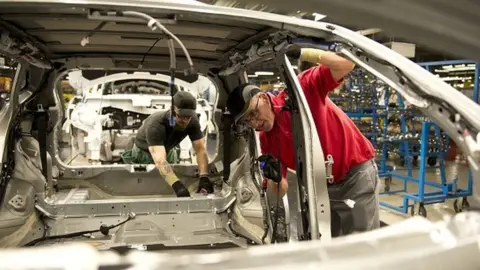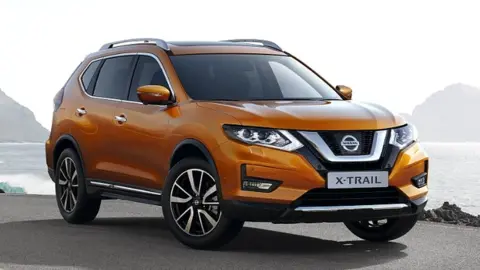Nissan chooses Japan over UK to build new X-Trail car
 Getty Images
Getty ImagesNissan has confirmed that the new X-Trail originally planned for its Sunderland plant will instead be made in Japan.
In a letter to workers, it said continued Brexit uncertainty is not helping firms to "plan for the future".
In 2016, the carmaker said it would build the new model in the UK after "assurances" from the government.
Unions described the news as "disappointing" and said they were "seriously concerned".
The government said Nissan's decision was "a blow to the sector" but that no jobs would go as a result.
Nissan has made cars at Sunderland since 1986 and employs almost 7,000 people.
Changing environment
Commenting on its decision, Nissan also said that since 2016 "the environment for the car industry in Europe has changed dramatically", including "changing emissions regulations".
In the UK, diesel cars that fail to meet the latest emissions standards now face a levy and a number of European countries, including the UK, have announced bans on both new diesel and petrol vehicles in the future.
As a result, sales of new diesel cars in the UK tumbled by 30% in 2018, according to the Society of Motor Manufacturers and Traders.
 Nissan
NissanNissan was always going to produce the X-Trail model at its Kyushu production hub but decided two years ago, "there was a good business case for bringing production to Europe as well," according to the firm's Europe chairman, Gianluca de Ficchy.
He said the company is now planning "to optimise our investments and concentrate production in Kyushu, instead of adding another production site".
Mr de Ficchy, said: "Nissan is investing heavily in new technologies and powertrains for the next generation of vehicles in our Sunderland plant.
"To support this, we are taking advantage of our global assets, and with X-Trail already manufactured in Japan, we can reduce our upfront investment costs."
'Disappointing'
Mr de Ficchy said the news would be "disappointing" to its UK team and partners, but that the workforce in Sunderland had the company's "full confidence".
"While we have taken this decision for business reasons, the continued uncertainty around the UK's future relationship with the EU is not helping companies like ours to plan for the future," he added.
A number of carmakers, including Jaguar Land Rover, Toyota and Vauxhall have expressed fears of disruption to their supply chains in the event of a no-deal Brexit.
Business Secretary Greg Clark said: "Nissan's announcement is a blow to the sector and the region, as this was to be a further significant expansion of the site and the workforce.
"The company has confirmed that no jobs will be lost. They have reiterated today their commitment to the UK by continuing to manufacture in Sunderland the current Qashqai, Leaf and Juke models and the new Qashqai model from 2020."
Unite's acting national officer for the car sector, Steve Bush, said: "This is very disappointing news for Sunderland and the North East and reflects the serious challenges facing the entire UK auto sector."
He added that the union remained "seriously concerned" that "the apprenticeships and additional jobs that come with future investment and which this community so desperately needs will be lost".
Sunderland Central MP Julie Elliott said the move was "devastating news for our city and the region".
She added: "The uncertainty around Brexit is always a factor now in any decisions made in manufacturing."
Labour leader Jeremy Corbyn said: "The Conservatives' botched negotiations and threat of a no-deal Brexit is causing uncertainty and damaging Britain's economy."

Analysis: The factors behind Nissan's decision
By Rob Young, BBC business reporter
There's been a run of bad news from the car industry in recent months.
Job losses have been announced at Jaguar Land Rover and Ford and the cancellation of Nissan's X-Trail investment at its Sunderland plant is just the latest disappointment from a sector that was booming a few years ago.
There are many who want to say this is all down to Brexit. But it's not.
 Getty Images
Getty ImagesDeclining car sales in China, the world's biggest car market, have unnerved the industry worldwide. As have falling car sales and an economic rough patch in Europe.
There are questions over whether diesel technology has a future after governments, who pushed it hard until a few years ago, and drivers, who previously liked its fuel efficiency, have become less keen on it.
In the UK, this is all set against the backdrop of Brexit uncertainty.
The car industry has long been worried about potential changes to trading rules after the UK leaves the EU. It's nervous about border taxes and customs delays disrupting its just-in-time model of manufacturing.
Nissan has been clear the decision to cancel its Sunderland X-Trail investment is a commercial decision. But it chose to say "continued uncertainty" around the UK's future relationship with the EU "is not helping" it plan for the future.
Big businesses tend to stay out of politics.
So Nissan's decision to highlight Brexit means it is clearly a concern in the minds of company executives.

Conservative Brexiteer Jacob Rees-Mogg said Nissan had "all sorts of problems that are nothing to do with Brexit", including "very considerable corporate governance problems" arising from ex-chairman Carlos Ghosn's arrest.
Production of the Qashqai - the best-selling crossover vehicle in Europe - makes up the majority of the current work at Sunderland.
There had been concerns that Nissan - part-owned by France's Renault - could move production to France in future to avoid any post-Brexit EU tariffs.
But when the X-Trail investment was initially announced, Nissan said hundreds of jobs would be created at the Sunderland plant.
It sparked questions over whether a deal between the carmaker and the government had been struck, although ministers insisted that no "financial compensation" had been offered.

